New review is up at Man, I Love Films. This week, I looked at a curious little horror film from Japan adapted from an award-winning book that also inspired a critically acclaimed manga series. It’s…something.
Horror Thursday: Goth
New review is up at Man, I Love Films. This week, I looked at a curious little horror film from Japan adapted from an award-winning book that also inspired a critically acclaimed manga series. It’s…something.
Horror Thursday: Goth
 Body horror is one of those totally hit or miss genres. Mediocrity is rare since the style is extreme by its nature. Either the conceit of the story works or it doesn’t. Beyond that, the best and the worst fall into shades of gray. Does the director choose visuals over storytelling? Does he linger too long on shocking images because he knows they’ll get a rise out of the audience even if it hurts the narrative? The tiny little choices in focus, acting style, and effects separate the the great from the good and the bad from the terrible.
Body horror is one of those totally hit or miss genres. Mediocrity is rare since the style is extreme by its nature. Either the conceit of the story works or it doesn’t. Beyond that, the best and the worst fall into shades of gray. Does the director choose visuals over storytelling? Does he linger too long on shocking images because he knows they’ll get a rise out of the audience even if it hurts the narrative? The tiny little choices in focus, acting style, and effects separate the the great from the good and the bad from the terrible.
Perhaps it’s unfair to mention that the writer/director of Antiviral is Brandon Cronenberg, son of David Cronenberg, the king of body horror. They’re experimenting within the same genre and even share some conceits–strong male lead, unreachable woman in peril, corporations as branded sources of pure evil–but choose wildly different focuses. For David Cronenberg, it’s the message of the film above all loyalty to storytelling or even character consistency. For Brandon Cronenberg, it’s all about overwhelming and oppressive visual structure to shock the audience into an unsettling numbness.
Antiviral is about the extremity of celebrity gossip culture. In an unspecified future, Syd March works for the largest and most popular distributor of celebrity diseases. His job is to obtain samples from sick celebrities, transport them to the lab, and alter their genetic code so they can be copywritten and sold to fans who want to share everything with their idols. Syd also works a side business, injecting himself with tiny portions of the celebrity disease sample to sell on the black market. It’s not the wisest career move.
Two new columns up at other sites today.
First, it’s the first Thursday of the month. That means Foreign Chops is up. Check out all the great links on films from Spain.
Foreign Chops #15: Spain
Second, my weekly horror review column is up at Man, I Love Films. I took a look at Stake Land and loved what I saw.
Horror Thursday: Stake Land
Did you check out the new episode of Slipstream: The Pulp Culture Vlog yet? Why not?
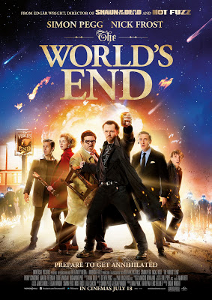 Edgar Wright and Simon Pegg’s Ice Cream and Blood Trilogy (each film features ice cream, blood, and an exaggerated play on film genre) ends on a high note with The World’s End. This clever sci-fi/comedy is the ridiculous love letter to the genre you’ve come to expect from the creators of the RomComZom (Shaun of the Dead) and one of the most entertaining, self-referential cop/action films ever (Hot Fuzz).
Edgar Wright and Simon Pegg’s Ice Cream and Blood Trilogy (each film features ice cream, blood, and an exaggerated play on film genre) ends on a high note with The World’s End. This clever sci-fi/comedy is the ridiculous love letter to the genre you’ve come to expect from the creators of the RomComZom (Shaun of the Dead) and one of the most entertaining, self-referential cop/action films ever (Hot Fuzz).
Gary King peaked in 1992 when he and his four best friends spent one glorious night going head to head with the Golden Mile. This 12 part pub crawl required the teenagers to drink one pint of beer at twelve different pubs in their home town of Newton Haven. They failed, but had the time of their lives instead. When Gary realizes that his goal was never achieved, he tricks his former friends into returning to Newton Haven for the first time in 20 years to finish the Golden Mile. Tensions reach the boiling point right when the friends discover something is terribly wrong with the town they ran away from.
Horror Thursday: Madhouse
Imagine if Behind the Mask: The Rise of Leslie Vernon didn’t have the serial killer/tour guide to the world of horror onscreen. Imagine if that same twisted slasher, heavily influenced by the good meta aspects of post-Scream American horror, used the camera as the guide to what’s going to happen. The director plays an active role in the story without saying a word. He lets the audience in on the next big scare without spoiling the specifics by letting a scene linger just a little longer than expected to make it clear that bad things will come.
 You’re Next is the brilliant experiment in meta-horror commentary that The Cabin in the Woods was marketed as. It’s a home invasion film that is so familiar with the tropes that it can spoil every scare scene (even the ending of the film itself) and still be an effective horror story. It’s a film that allows the characters to play ridiculous dialogue and story developments so straight that you can’t help but laugh while buckets of blood are pumped onto the floor.
You’re Next is the brilliant experiment in meta-horror commentary that The Cabin in the Woods was marketed as. It’s a home invasion film that is so familiar with the tropes that it can spoil every scare scene (even the ending of the film itself) and still be an effective horror story. It’s a film that allows the characters to play ridiculous dialogue and story developments so straight that you can’t help but laugh while buckets of blood are pumped onto the floor.
The Davison children reunite at their parents brand new and totally isolated mansion for a wedding anniversary party. Each of the four children bring their love interests to the joy of the retired parents. Everything is going perfectly nice until someone is taken down by a crossbow attack during a huge argument at the dinner table. Now the family is in a fight for their lives against a group of animal-masked invaders bent on taking out the entire Davison clan.
Horror Thursday: Deadball
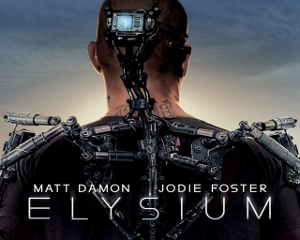 Sometimes, you just have to accept what a film is telling you. Questioning it will inevitably lead to disappointment. Even a minor question about a character shift can unravel an entire film.
Sometimes, you just have to accept what a film is telling you. Questioning it will inevitably lead to disappointment. Even a minor question about a character shift can unravel an entire film.
Elysium takes place in a beautifully-realized future. Earth is overpopulated without nearly enough resources to take care of everyone. The richest of the rich live in a space station with an artificially maintained atmosphere of perfect landscaping and medical pods that cure all ailments; everyone else lives on the barren earth, toiling in mindless jobs in the hopes of building a better life for themselves some day on Elysium.
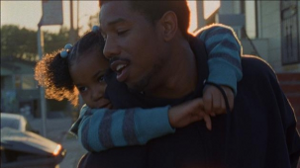 It’s New Year’s Eve 2009. Oscar, a young man with a daughter and a troubled past, is planning a series of celebrations. His mother’s birthday is December 31 and he’s going with his friends and girlfriend to San Francisco afterwards to watch the fireworks at midnight. A cascade of bad events falls upon Oscar the last day of the year, but he’s hopeful that a train ride for New Year’s will be the start of a better life.
It’s New Year’s Eve 2009. Oscar, a young man with a daughter and a troubled past, is planning a series of celebrations. His mother’s birthday is December 31 and he’s going with his friends and girlfriend to San Francisco afterwards to watch the fireworks at midnight. A cascade of bad events falls upon Oscar the last day of the year, but he’s hopeful that a train ride for New Year’s will be the start of a better life.
Fruitvale Station is based on a recent true crime story put to rest by cellphones. Bystanders at the scene of the crime recorded everything that happened. Without cellphones, the case might not have been resolved and it definitely would not have received the attention needed to begin major safety reforms to a public transportation system.
Writer/director Ryan Coogler hitches Fruitvale Station to cellphone technology.
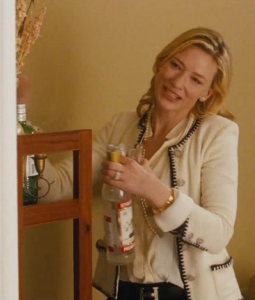 Woody Allen’s newest film Blue Jasmine is all about Jasmine, formerly Jeanette, and her sister Ginger. Jasmine was on top of the world until her husband was arrested for all sorts of financial crimes. She’s now forced to move in with her sister Ginger, who already let everyone know that Jasmine had a nervous breakdown and now pops Xanax like Pez to even come close to functioning in society. For the first time in her life, Jasmine has to learn to take care of herself.
Woody Allen’s newest film Blue Jasmine is all about Jasmine, formerly Jeanette, and her sister Ginger. Jasmine was on top of the world until her husband was arrested for all sorts of financial crimes. She’s now forced to move in with her sister Ginger, who already let everyone know that Jasmine had a nervous breakdown and now pops Xanax like Pez to even come close to functioning in society. For the first time in her life, Jasmine has to learn to take care of herself.
Woody Allen’s direction is solid but the screenplay is far too mean-spirited. The film is a drama that encourages the audience to laugh at Jasmine and Ginger for the failings, not laugh with them because of their circumstances and actions. It’s rather disturbing to see severe anxiety used as a punchline in and of itself with no accompanying joke. The audience is meant to laugh at Jasmine babbling to herself when she has an episode, demonstrated by commentary or wacky sitcom-level reactions to her behavior.
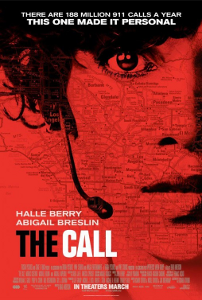 Sometimes, a film is one scene away from being great. In the case of The Call, the last scene is so out of sync with the rest of the story that the film suffers.
Sometimes, a film is one scene away from being great. In the case of The Call, the last scene is so out of sync with the rest of the story that the film suffers.
Jordan is a 911 operative at the top of her career. One simple mistake during a high stakes call shakes her so hard she asks to be removed from the actual call table. While training a new group of operatives, Jordan is put back at the desk for a second attempt to save a young teen from a kidnapping.
The Call builds a large amount of tension out of a very odd conceit. The film jumps back and forth between the control room with all the 911 operatives and the teenage girl calling for help. Everything is told in tightly framed close-ups that focus the eye on important details for the story. The presentation is slick and the quick cuts between the different players really elevate the story into something special.
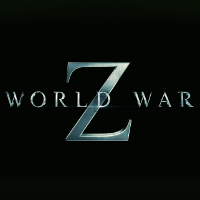 World War Z starts out as a decent film once you get past that it has barely any basis at all in Max Brooks’ novel of the same name. It’s insulting to license a novel that ambitious and intelligent and turn it into a generic war movie with a horror twist.
World War Z starts out as a decent film once you get past that it has barely any basis at all in Max Brooks’ novel of the same name. It’s insulting to license a novel that ambitious and intelligent and turn it into a generic war movie with a horror twist.
Brad Pitt plays a retired UN operative called back into duty when a mysterious ailment causes corpses to rise from the grave and violently attack living humans. Reluctant to accept the reality of zombies, the surviving world forces call on military and medical experts to seek out patient zero and find a cure.
For most of the running time, World War Z is a palatable action/horror film built on the framework of a war movie. The action scenes are serviceable. There are some ambitious concepts being explored, which is honestly the big advantage of the zombie genre. Like vampires and sexuality, zombies are entwined with social commentary by virtue of the greatest stories in the field.
 Guillermo Del Toro has promised the world an H.P. Lovecraft film for years and he may have just quietly delivered it in Pacific Rim.
Guillermo Del Toro has promised the world an H.P. Lovecraft film for years and he may have just quietly delivered it in Pacific Rim.
In the not to distant future, a rift has open beneath the ocean that transports colossal monsters, called Kaiju (arguably Ancient Ones ala Lovecraft), to earth. The only thing that successful stops the Kaiju is Jaeger technology, giant robots controlled by two pilots. The pilots link on a subconscious level to control half of a Jaeger each with perfect coordination. When more powerful monsters than ever are poised to rise out of the rift, a retired pilot and a total rookie are teamed up as a last resort to hold off the extinction of humanity.
del Toro set out to make an airy summer action film and turned out another dark, brooding, and thoughtful genre film instead.
 Would You Rather follows a long tradition of horror films that take a normal scenario–a party game, an event, a right of passage–and turn it into a blood-soaked nightmare of ever-worsening odds. As evident from the title, Would You Rather is a horror film centered on the party game of the same name. A billionaire invites eight down on their luck people to compete for all the money and resources they need to fix their lives. The catch is that only one person can survive the game without being eliminated, really executed.
Would You Rather follows a long tradition of horror films that take a normal scenario–a party game, an event, a right of passage–and turn it into a blood-soaked nightmare of ever-worsening odds. As evident from the title, Would You Rather is a horror film centered on the party game of the same name. A billionaire invites eight down on their luck people to compete for all the money and resources they need to fix their lives. The catch is that only one person can survive the game without being eliminated, really executed.
Screenwriter David Guy Levy does manage to create a lot of suspense and intrigue once the game is in motion. The problem is that he tips his hand too early. We only meet one of the contestants for real before the game begins. The rest are introduced at the party itself. You just know that character is going to be onscreen as long as possible because the audience is already set to root for her. If the film actually started at the dinner party and introduced everyone before the game began, all of the narrative problems would be avoided.